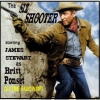
Broadcast History: 20 September 1953 to 24 June 1954
Theme Tune: Highland Lament
The Six Shooter , created by Frank Burt, who also wrote many of the episodes, and lasted only one season of 39 episodes on NBC (Sept. 20, 1953–June 24, 1954). Initially, it was broadcast on Sundays at 9:30 p.m. Eastern Time, through October 11. Then it was heard at 8:30 p.m. for three weeks. Finally, on November 8, 1953 through March 21, 1954, it was broadcast Sundays at 8 p.m. Beginning April 1, 1954 through the final episode it was on Thursdays at 8:30 p.m. One old-time radio directory called the program "a last, desperate effort by a radio network (NBC) to maintain interest in adventure drama by employing a major Hollywood movie star in the leading role."
James Stewart starred as Britt Ponset, a drifting cowboy in the final years of the wild west. Episodes ranged from straight western drama to whimsical comedy. A trademark of the show was Stewart's use of whispered narration during tense scenes that created a heightened sense of drama and relief when the situation was resolved.
Some of the more prominent actors to perform on the program included Parley Baer, Virginia Gregg, Harry Bartell, Howard McNear, Jeanette Nolan, Dan O'Herlihy, Alan Reed, Marvin Miller and William Conrad (often credited as "Julius Krelboyne" because he was also the star of CBS' Gunsmoke at the time). Some did multiple episodes playing different characters.
Each episode opened with the announcer (Hal Gibney; John Wald in later episodes) stating: "The man in the saddle is angular and long-legged. His skin is sun-dyed brown. The gun in his holster is gray steel and rainbow mother-of-pearl, its handle unmarked. People call them both 'the Six Shooter'."
The haunting theme music was "Highland Lament", arranged by series composer Basil Adlam and written by British film composer Charles Williams. Jack Johnstone was the producer-director for NBC Radio, in association with Revue Productions.
The final episode, "Myra Barker", provided a satisfying (if melancholy) finale to the series: Ponset falls in love with Myra, and proposes marriage. Myra, after thinking it over, appears to accept—but then tells Britt she's heard that Sheriff Jennings of Eagle Falls has asked for his help, and Britt admits that he feels obligated to go. Myra tells Britt to go and not come back—telling him some adventure will always call him, and he'll always go, or regret not going. Britt goes, resuming his wanderings, but not before revealing to the audience that he knows he was *not* needed in Eagle Falls—and knows Myra knows that too. The moment comes across as a moment of supreme self-realization by Britt that he always will be a wanderer.
From Wikipedia
